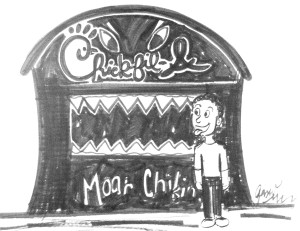
Ciao bella, Chick-fil-A! Your final days in Cox Hall are slipping away faster than the chicken sandwiches disappear during lunch hour.
O sweet, juicy-yet-crunchy chicken sandwiches. I prefer thee without pickles, just chicken and bun. Splatter one packet of mayo in between and you have my weekday lunch staple. For balance, toss in an order of waffle fries fresh out the fryer, the ridges still glistening with 100 percent peanut oil, yes, toss in an order of those.
It was the waffle fries that first enraptured me. I was in sixth grade, and those waffle fries were so radically different than the golden brown slend-ies from McDonalds or BK. The skin was still on 'em, the bite was so rich and full. I recall heading to the drive-thru on a Sunday afternoon only to see it closed. What's this? Applebee's would have to do that day. In high school, my adoration switched to the Chick-fil-A operating in the food court of Quaker Bridge Mall, off Route 1 in Jersey. And now, my current betrothed is being taken away. But in all these years, was my Chick-fil-A chowtime immoral?
Some brief context: Chick-fil-A is owned by a Baptist family, the Cathys of Georgia, and last June, Dan T. Cathy, the President, COO and son of the founder, gave his stance on marriage. In an interview with a Christian news organization, he said Chick-fil-A supported "the biblical definition of the family unit." In other words, the Cathys oppose same-sex marriage. Further, Kim Severson of The New York Times reports a 2011 investigation of Chick-fil-A's tax records, which show the company's operators, its WinShape Foundation and the Cathy family had donated millions of dollars to groups involved in defeating same-sex marriage initiatives.
This was a textbook PR disaster. Despite it all, according to Leon Stafford of The Atlanta Journal-Constitution, the company posted $4.6 billion in sales in 2012, up by 14 percent from $4.1 billion a year earlier. I wasn't kidding about them waffle fries.
I'll sidestep the debate and just go straight to the point: Chick-fil-A and its owners are intolerant. Given this, are my lunch hour trips to the Cox Hall Chick-fil-A immoral? I buy my usual, the chicken sandwich with waffles fries and two packets of mayo. But through this action, though it is a commercial transaction for food, is this choice immoral?
I'm buying something that in all likelihood is engineered to taste delicious, and in going through with this transaction, I not only receive my food; I am also, essentially, contributing to Chick-fil-A's profit margin. This money is spent supporting intolerance, as well as adding value to a company whose hegemony has sided with intolerance. I'm not endorsing their position, obviously, but I am economically aiding their cause. So am I in the wrong? It seems like it. So then, and perhaps this is even more troubling, why do I keep going back?
And do the views of Chick-fil-A constitute sufficient grounds to remove a commercial restaurant from campus? In other words, is Chick-fil-A's removal from Cox perhaps unfair? Well, the decision to remove Chick-fil-A was not related to politics or student calls for its removal, according to the senior director of Emory's Food Service Administration in a March 22 Wheel article. PolitiFact Georgia, a Tampa Bay Times organization, published a piece on April 19 which investigated this claim (the article is titled "Emory says Chick-fil-A decision not political" and is written by fellow Wheel editor Karishma Mehrotra. No, I'm not plugging a colleague; it's a diligent piece of reporting which gives you a real taste of Emory).
While there was an objective process to review all food vendors, according to the report, incomplete documentation provided by Emory did not confirm the claim that Chick-fil-A was not removed for political reasons. A student co-chair of the Food Advisory committee said the restaurant's values were a contributing, but not a deciding factor, in the committee's decision.
However, the same student later clarified values refers to "human development values" such as physical well-being. Yet proposed plans call for pizza and pasta to replace Chick-fil-A, so this claim seems questionable as well.
Honestly, who knows with the Emory administration these days. According to the same PolitiFact piece, Emory instructed the students on the Food Advisory committee to no longer comment on the issue, and the Food Service director who made the initial claim referred all inquires to Campus Communications.
Of course, that is the office where all inquires go to die.
I guess in a year of bungled PR, Campus Communications might be trying out a new, more conservative strategy: saying nothing at all.
Regardless of the ultimate reasons for the restaurant's removal, why not let the students vote with their wallet? Are not the daily decisions of the individual consumers who frequent Cox the freest way of determining whether Chick-fil-A, and its views, belong on campus or not?
If Chick-fil-A is bigoted and does not reflect our values, then business will suffer and eventually be driven out. Some committee and some surveys and some focus groups should not determine Chick-fil-A's removal. The real surveys at the cashier's line should. Unless our actual values are not reflected when we purchase a chicken sandwich? But in that case what's wrong with giving customers what they want? Hah.
I do know, however, that I'll be sorely missing Chick-fil-A next year.
Associate Editor Vincent Xu is a College junior from Princeton, N.J.
Cartoon by Jessica Goldblum
Read More
Trending







